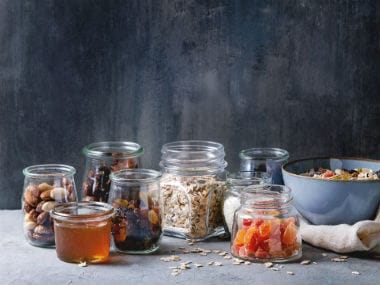A spoonful of sugar might make the medicine go down but a dollop of butter can make even a namak paratha mouth-watering. We all know that fats and sugars are bad for health. But are they equally bad? Here’s how the scientific evidence stacks up: [caption id=“attachment_7778181” align=“alignleft” width=“380”]  Representational image. Image source: Getty Images.[/caption]
Good fat, bad fat
Broadly, there are three types of fats: saturated fats, unsaturated fats and trans fats. Saturated fats are bad for health, and trans fats are worse. Both induce the formation of low-density lipoprotein (LDL) cholesterol - the bad kind - in the body. In addition to promoting LDL, trans fat also causes a drop in high-density lipoprotein (HDL) or the good cholesterol - therefore, leading to inflammation, putting you at greater risk of developing cardiovascular diseases. Saturated fats are solid at room temperature. Ghee and butter fall in this category - the American Heart Association recommends limiting their intake to 5-6% of your total daily calories. Trans fats do not occur naturally. When we heat oil at extremely high temperatures or reuse oil, solid fatty bits form - these are trans fats. Food processing industry often makes trans fats because they increase the shelf life of food. The most common sources of trans fats are cookies, pies, cakes, frozen pizza, crackers or spreads.
The best fat
Omega 3 is a type of polyunsaturated fats. Our body does not make omega 3 - that’s why we need to get it from our food. Omega 3 is good for heart health and it also prevents the formation of clots in the blood - potentially protecting us from a heart attack or a stroke. The richest sources include fatty fish such as salmon, sardines, walnuts and flax seeds. The American Heart Association recommends replacing saturated fats with poly and monounsaturated fats - according to the association, the switch can have the same effect as taking statins (drugs to reduce cholesterol).
All sugars are not the same either
Sugars can be of many different kinds as well: broadly, there are naturally occurring fructose in fruits and complex sugars in vegetables and whole grains. And then there are simple or refined sugars of the kind we use in cakes and cookies. So long as we eat a balanced diet, the fructose from fruits (doctors recommend we eat two to three servings of fruits daily) and lactose in milk are healthy. The real villain here is “added sugars”. These are the sugars that are added during food preparation or before serving it (think, sugar in tea or milk), soft drinks, candy, cookies or ice creams - the list is endless. There are so many added sugar foods in our daily diet that we exceed the normal intake limit - this is where harmful effects start appearing. According to the Indian dietary guidelines, sugar consumption should not exceed 10% of total dietary energy, however, it is better if your’s is even lower than this. Here’s why:
- Sugar makes the body resistant to insulin - putting you at greater risk of diabetes
- High sugar foods cause big spikes in blood sugar - sudden rises and drops increase cravings, pushing you to eat more than you might otherwise
- The body stores excess sugar in the form of fat - you put on weight
- Level of bad cholesterol increases in the body - the risk of cardiovascular disease rises
- Sugar is just bad for teeth
The consensus, then, is that unsaturated fats are good and naturally occurring sugars in fruits are not bad. Beyond this point, cardiologists recommend eating everything in moderation. So by all means, drizzle olive oil on to your salad, or have an avocado toast in the morning, or grab a handful of nuts while leaving home - all of them contain polyunsaturated and monounsaturated fats. But keep in mind that one gram of fat contains more calories (9 calorie/grams) than one gram of protein or carbohydrate (4 calorie/grams) - so watching the total calories is just as important as where you get those calories. For more information, please read our article on Fats: Types, Benefits, Sources_._ Health articles in Firstpost are written by myUpchar.com, India’s first and biggest resource for verified medical information. At myUpchar, researchers and journalists work with doctors to bring you information on all things health.


)

)
)
)
)
)
)
)
)



